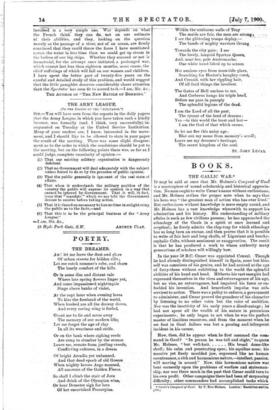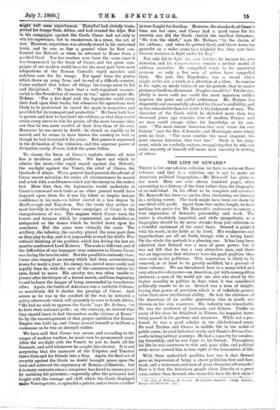BOOKS.
THE GALLIC WAR.* IT may be said at once that Mr. Holmes's Conquest of Gaul is a' masterpiece of sound scholarship and historical apprecia- tion. No man ought to write Cmsar's name without enthusiasm, and Mr. Holmes strikes the proper note when he says that his hero was " the greatest man of action who has ever lived." Bat enthusiasm without knowledge is mere empty sound, and Mr. Holmes has a vast knowledge wherewith to support his admiration and his history. His understanding of military affairs is such as few civilians possess; he has approached the ethnology of the Gauls in a spirit at once learned and sceptical; he freely admits the clap-trap for which ethnology has so long been an excuse, and then proves that it is possible to write of fair hair and long skulls, of Ligurians and brachy- cephalic Celts, without sentiment or exaggeration. The result is that he has produced a work to whose authority many generations of scholars will willingly bow.
In the-year 59 B.C. Ctesar was appointed Consul.. -Though he had already distinguished -himself in Spain, none but hid. self was conscious of his genius, and he had arrived at the age of forty-three without exhibiting to the world the splendid abilities of his hand and head. Hitherto his vast energies had expressed themselves in the vices and extravagance of his age, but no vice, no extravagance, had impaired his force or en- feebled his invention. And henceforth impulse was sub- servient to action. There was a policy to enforce, a government to administer, and Ctesar proved the grandeur of his character by listening to no other voice but the voice of ambition. Nor was the inactivity of his early years a disadvantage ; he had not spent all the wealth of his nature in precocious experiments; he only began to act when he was the perfect master of limitless resources, and from the moment when he set foot in Gaul failure was but a. passing and infrequent incident in his career.
How, then, did he appear when be first assumed the com• mend in Gaul P "In person he was tall and slight," to quote Mr. Holmes, " but well-knit His broad dome-Me skull ; his calm and penetrating eyes; his aquiline nose; his massive yet finely moulded jaw, expressed like no human countenance, a rich and harmonious nature,—intellect, passion, will moving in accord." Now, this harmonious nature was bent earnestly upon the problems of warfare and statesman- ship, nor was there much in the past that Ofesar could turn to his own profit.. Other campaigns there had been of surpassing difficulty; other commanders had accomplished tasks which • Cesar's Conquest of Gaut. • By T. Rice Holmes. London :'Macmillan and Co. [Os.] might —war seem supeil—uma—Hanniliarhafl'aIiiii.4 trine- ported his troops from Africa, and had crossed the Alps. But in his Campaigns against the Gauls Caesar had not only to win his experience, but to reconstruct, in a sense, the. art of war.: However, experience was already stored in his untrained brain, and he was as fine a general when he first con- fronted the Helvetii as when he returned to Rome from a pacified Gaul. Nor has warfare ever been the same since it was transmuted by the brain of Caesar, and the great cam- paians of our modern world have for the most part been mere adaptations of the Roman Consul's rapid marches and sedulous care for his troops. For apart from the genius which threw an army from end to end of a difficult country, Caesar realised that before all things his troops must be fed and disciplined. " He knew that a well-organised commis- sariat is the foundation of success in war," again we quote Mr. Holmes'. "For a few days' raid the legionaries could carry their food upon their backs, but whenever his operations were likely to be protracted he stored his grain in magazines and provided for its transport and protection." He knew both how to govern and how to fascinate his soldiers, so that they would strain every nerve to win his praise, all the more because they saw that he was more careful of their lives than of his own. Moreover, he-was never in doubt; he struck as rapidly as he moved, and he seems to have known the country as well as though he had traversed it for years. But genius is expressed in the divination of the unknown, and this supreme power of divination rarely, if ever, failed the great Julius.
To choose the finest of Caesar's exploits where all were fine is invidious and profitless. We know not which to admire the most,—the rapid march against the Helvetii, the sea-fight against the Veneti, the relief of Cicero, the blockade of. Alesia. Was a general hard-pressed, the advent of Cesar meant salvation, for under all circumstances he moved and acted with a suddenness which put the enemy to the rudest test. More than that, the legionaries would undertake at Cmsar's command such tasks as no other general would have imposed upon them, for it was his talent to inspire instant confidence in his men,—a talent shared in a less degree by Marlborough and Napoleon. But the truth that strikes us most forcibly in re-reading these campaigns of Cesar is the changelessness of war. The engines which Cesar used, the towers and terraces which he constructed, are doubtless as antiquated as the stones which he hurled down upon his assailants. But the arms were virtually the same. The 4tillery, the infantry, the cavalry, played the same part then as they play to-day, and it is impossible to read the Gallic War without thinking of the problem which has during the last six months confronted Lord Roberts. The scale is different, and if the difficulties of our transport were unknown to Caesar, Caesar was facing the heavier odds. But the parallel is curiously close. Caesar also engaged an enemy which had been accumulating stores for many a year; his enemy, too, moved more easily and rapidly than he, with the care of the commissariat before his eyes, dared to move. His cavalry, too, was often unable to pursue after the fatigue of a forced march, and from beginning to end he knew the danger of being surrounded by treacherous allies. Again, the battle of Aduataca was a veritable Colenso, so mercilessly did it shatter the prestige of Caesar. And severe as he was in the conduct of the war, he initiated a policy afterwards which will presently be ours in South Africa. " He had no wish to oppress the Gauls," says Mr. Holmes, "or to hurt their national pride ; on the contrary, he desired that they should learn to feel themselves really citizens of Rome." So by the encouragement of that proper ambition the Roman Empire was built up, and Caesar proved himself as brilliant a statesman as he was an intrepid soldier.
We have said that Caesar was severe, and according to the usages of modern warfare, he must even be pronounced cruel. After the sea-fight with the Veneti, he put to death all the Senators, and sold whomever he caught into slavery. It is not surprising that the massacre of the Usipetes and Tencteri threw. Catctand his friends into a fury. Again, the final act of severity against the Gauls no doubt brought peace upon the land and achieved the supremacy of Roman civilisation ; but it is many centuries since a conqueror has dared to ensure peace by maiming his prisoners,—especially after the prisoners had fought with the courage and skill which the Gauls displayed ander Vercingetorix, as splendid a patriot and as brave a soldier irs—everlonatticiffieicinm; HoWever, the standards of Caesar's time are not ours, and Cesar had a good cause for his severity, nor did the Chula cherish the smallest bitterness. " He won the chiefs," says Mr. Holmes, " by the charm of his address ; and when he quitted Gaul, and threw down the gauntlet on a wider arena to a mightier foe, they sent their bravest warriors. to fight tinder his flag."
Not only did he fight his own battles; he became his own historian, and his Commentaries remain a perfect model of military narrative. He compelled words to his masterful purpose as only a few men of action have compelled them. His pen, like Napoleon's, was a sword which might strike out a truth or a situation at a blow. So concise is his style, so nicely balanced are his periods, that he makes plainness itself an adornment. Simplex muntlitiis Yetthe sim- plicity is never cold, nor could the most ingenious artifice improve the quiet and artful artlessness. Mr. Holmes has eloquently and successfully pleaded for Caesar's credibility, and no less remarkable than his truth is his judgment of men. The character of the Gauls which he sketched more than two thousand years ago remains true of modern France, and no man could escape either his knowledge or his cen- sure. " The most sincere historian that ever wrote his own history," says the Due d'Aiunale ; and Montaigne more wisely puts no limit : " The most concise, the most eloquent, the most sincere historian that ever was." Such is his judg- ment, which we cordially endorse, recognising that be who- can write sincerely of himself will never lack sincerity in writing of others.











































 Previous page
Previous page